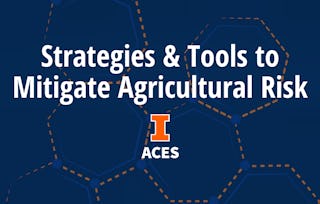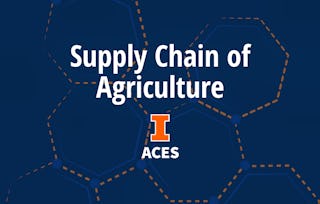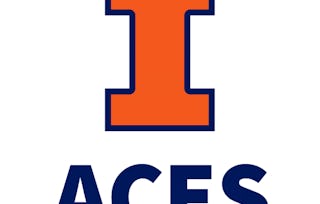Learners will be able to describe the crop production cycles of agriculture for annual and permanent crops, explain the financial characteristics and risks of food production, discuss the various types of land ownership and rental agreements for the use of agricultural land, and describe personal, external, and food production risks that influence decision-making in agriculture.

Risks to Crop Production in Agriculture
Ends soon: Gain next-level skills with Coursera Plus for $199 (regularly $399). Save now.

Risks to Crop Production in Agriculture
This course is part of Agribusiness and Sustainable Food Production Economics Specialization



Instructors: Paul B. Stoddard
1,978 already enrolled
Included with
Recommended experience
What you'll learn
Crop production cycles for annual and permanent food production crops
Financial characteristics, types of land ownership, and volatility of the capital intensive agriculture industry
Personal, external, and food production risks that influence decision-making in agriculture
Skills you'll gain
Details to know

Add to your LinkedIn profile
6 assignments
See how employees at top companies are mastering in-demand skills

Build your subject-matter expertise
- Learn new concepts from industry experts
- Gain a foundational understanding of a subject or tool
- Develop job-relevant skills with hands-on projects
- Earn a shareable career certificate

There are 4 modules in this course
In the course orientation, you will become familiar with the course, your classmates, and our learning environment. The orientation will also help you obtain the technical skills required for the course. In the second part of this module, you will define a crop, explain the crop production cycles, and describe the characteristics and differences between annual crops and permanent crops.
What's included
17 videos17 readings2 assignments1 discussion prompt
In this module, you will define the characteristics and structure of a farm, explain the financial risks and capital intensity of agriculture, and describe the timing and volatility of cash flow in production agriculture.
What's included
10 videos4 readings1 assignment
In this module, you will describe the types of land ownership, explain rental agreement options for agricultural land, and examine concerns of sustainability of agricultural land.
What's included
7 videos2 readings1 assignment
In this module, you will describe personal, external, and farm production risks that influence decision-making practices. Specifically, you will investigate policy, global trade, energy use, and legal issues of off-farm and on-farm risks.
What's included
12 videos7 readings2 assignments
Earn a career certificate
Add this credential to your LinkedIn profile, resume, or CV. Share it on social media and in your performance review.
Offered by
Explore more from Business Strategy
 Status: Free Trial
Status: Free TrialUniversity of Illinois Urbana-Champaign
 Status: Free Trial
Status: Free TrialUniversity of Illinois Urbana-Champaign
 Status: Free Trial
Status: Free TrialUniversity of Illinois Urbana-Champaign
 Status: Free Trial
Status: Free TrialUniversity of Illinois Urbana-Champaign
Why people choose Coursera for their career





Open new doors with Coursera Plus
Unlimited access to 10,000+ world-class courses, hands-on projects, and job-ready certificate programs - all included in your subscription
Advance your career with an online degree
Earn a degree from world-class universities - 100% online
Join over 3,400 global companies that choose Coursera for Business
Upskill your employees to excel in the digital economy
Frequently asked questions
Yes! Although completion of the Coursera course alone is not credit-bearing, it is a required component of a graduate-level Canvas course that can be "stacked" toward advanced credentials such as an academic (transcriptable) graduate certificate or a degree. If you decide to pursue further education, the credits you earn from this course can be applied toward a formal academic program, provided that you meet all the requirements of admission to the certificate or degree.
To access the course materials, assignments and to earn a Certificate, you will need to purchase the Certificate experience when you enroll in a course. You can try a Free Trial instead, or apply for Financial Aid. The course may offer 'Full Course, No Certificate' instead. This option lets you see all course materials, submit required assessments, and get a final grade. This also means that you will not be able to purchase a Certificate experience.
When you enroll in the course, you get access to all of the courses in the Specialization, and you earn a certificate when you complete the work. Your electronic Certificate will be added to your Accomplishments page - from there, you can print your Certificate or add it to your LinkedIn profile.
More questions
Financial aid available,




